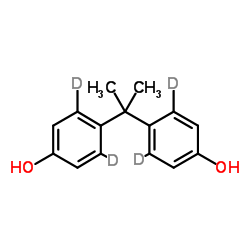4,4'-Propane-2,2-diyldi(3,5-2H2)phenol
Modify Date: 2025-08-27 08:55:52

4,4'-Propane-2,2-diyldi(3,5-2H2)phenol structure
|
Common Name | 4,4'-Propane-2,2-diyldi(3,5-2H2)phenol | ||
|---|---|---|---|---|
| CAS Number | 347841-41-2 | Molecular Weight | 232.311 | |
| Density | 1.1±0.1 g/cm3 | Boiling Point | 400.8±25.0 °C at 760 mmHg | |
| Molecular Formula | C15H12D4O2 | Melting Point | N/A | |
| MSDS | N/A | Flash Point | 192.4±17.8 °C | |
Use of 4,4'-Propane-2,2-diyldi(3,5-2H2)phenolBisphenol A-d4-1 is the deuterium labeled Bisphenol A[1]. Bisphenol A is a phenolic, organic synthetic compound widely used in the production of polycarbonate plastics and epoxy resins. Bisphenol A is a reproductive, developmental, and systemic toxicant, often classified as an endocrine-disrupting compound (EDC). Bisphenol A is associated with many diseases, including cardiovascular diseases, respiratory diseases, diabetes, kidney diseases, obesity, and reproductivedisorders[2][3]. |
| Name | bisphenol-a-3,3',5,5'-d4 |
|---|---|
| Synonym | More Synonyms |
| Description | Bisphenol A-d4-1 is the deuterium labeled Bisphenol A[1]. Bisphenol A is a phenolic, organic synthetic compound widely used in the production of polycarbonate plastics and epoxy resins. Bisphenol A is a reproductive, developmental, and systemic toxicant, often classified as an endocrine-disrupting compound (EDC). Bisphenol A is associated with many diseases, including cardiovascular diseases, respiratory diseases, diabetes, kidney diseases, obesity, and reproductivedisorders[2][3]. |
|---|---|
| Related Catalog | |
| In Vitro | Stable heavy isotopes of hydrogen, carbon, and other elements have been incorporated into drug molecules, largely as tracers for quantitation during the drug development process. Deuteration has gained attention because of its potential to affect the pharmacokinetic and metabolic profiles of drugs[1]. |
| References |
| Density | 1.1±0.1 g/cm3 |
|---|---|
| Boiling Point | 400.8±25.0 °C at 760 mmHg |
| Molecular Formula | C15H12D4O2 |
| Molecular Weight | 232.311 |
| Flash Point | 192.4±17.8 °C |
| Exact Mass | 232.140137 |
| PSA | 40.46000 |
| LogP | 3.43 |
| Vapour Pressure | 0.0±1.0 mmHg at 25°C |
| Index of Refraction | 1.599 |
| Phenol-3,5-d, 4,4'-(1-methylethylidene)bis- |
| 4,4'-(2,2-Propanediyl)di(3,5-H)phenol |
| 4,4'-Propane-2,2-diyldi(3,5-H)phenol |